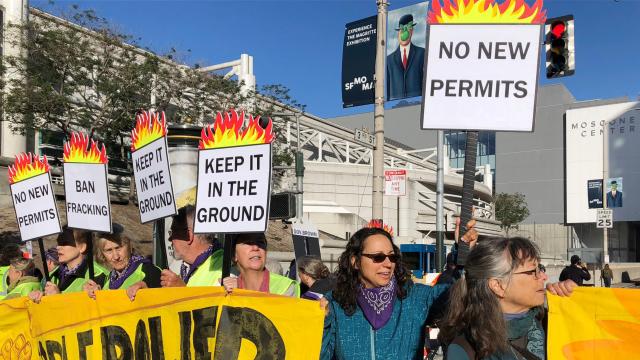A sweeping report that evolved from work that helped ban fracking in New York State has been released to help the American public fight the practice as it pops up elsewhere across the country. Published last week by the Physicians for Social Responsibility (the group that won a Nobel Peace Prize in 1985 for its work educating the public on the dangers of nuclear war) and the Concerned Health Professionals of New York (CHPNY), the updated report is an easy-to-read compendium of how fracking impacts people’s health, from the direct impact of wells and pipelines, to its role in exacerbating climate change.
“Wherever you live across the U.S. there’s a piece of fracking infrastructure across your community. What you need to know about the health risks you’re being compelled to endure you can find in this report,” Sandra Steingraber, a biologist at Ithaca College and co-founder of CHPNY, told Gizmodo.
She is one of the compendium’s authors and was also involved in the first version of the report, which started out as a few pages in a letter to the New York governor that eventually helped lead to the state’s fracking ban in 2014.
According to Steingraber, at the time there were less than 65 studies available on the health risks caused by fracking. Today, the report compiles 1700 as well as information gathered from stories written by investigative journalists who, she says, have access to information that scientists don’t (for instance, information obtained via Freedom of Information Act).
The report also includes data gathered from SEC investor filings because, while the federal government does not require fracking operations to publicly reveal if they’re releasing carcinogens into the air or water, the companies do have to assess the risks they’re undertaking for their shareholders. And knowing whether or not an explosion is possible or a chemical contamination might need to be cleaned is a back door way into assessing health risks, she said.
“We hope that knowledge is power,” Steingraber said, noting that the report is written in intentionally plain, easy to understand language, offers brief, simple abstracts of all the studies it tracks, and is open-source. It was compiled entirely by volunteer scientists, doctors, and activists when weren’t doing their day jobs “as a labour of love,” she said.
The broad findings of the report are that fracking is, well, bad for everybody’s health. As previous studies have documented, fracking endangers drinking water, it poses chemical exposure risks to those that live nearby, and it contributes to air pollution and smog. In terms of its climate change impact, fracking might actually be worse than coal because it produces methane – one of the most potent greenhouse gases – when it is burned for fuel use and even more so through leaks from the wells.
But the report also contains less well-known findings about the social and societal consequences of fracking infrastructure.
For example, more than a dozen studies and investigations (including articles from sociological journals and newspaper reports) have shown that fracking disproportionately impacts women’s health, in addition to impacting a community’s social well being.
“Jobs are going to out-of-state workers, and they live in ‘man-camps’ — groups of young male workers,” Steingraber said. In five different states and Canada, studies investigating different outcomes have shown teen pregnancy rates going up along with rates of rape, STD, violent victimization of all kinds, sex trafficking, drunk driving, and traffic fatalities. One study in North Dakota found an increased number of registered sex offenders and organised crime.
And when fracking workers don’t live in camps but instead rent homes in town, it can drive up rental prices, a problem that Pennsylvania tried to fix with laws to no avail.
“In some cases that can provoke homelessness among people who are barely able to hang onto housing and that tends to be single mums. So there’s some evidence that these [operations] push children into foster care,” Steingraber said.
Steingraber also notes that the most reliable evidence the report has found against fracking is an increase in premature births, babies born too small, and children born with birth defects. “And of course pregnant women are everywhere,” she said. “If it’s not safe for pregnant women it’s not safe.”
And because the compendium includes not only the direct and obvious health impacts but also the trickle-down, broader ways that fracking affect health, Steingraber says future iterations of the compendium will also include the impacts of plastic. “Ethane is a fracking waste product but the industry can sell it to the plastics industry,” she said.
All of this information is more critical now than ever as the Trump Administration, which recently rebranded natural gas “freedom gas”, is focused on rolling back methane regulations that impact fracking and ramping up operations around the country.
There are currently a handful of export terminals but dozens are in the planning or building stages. Steingraber sees the report as a “one-stop shopping for people who are facing fracking goliaths,” as she put it.
Whether it’s “as a pipeline or a well pad or a shipping terminal – we want everyone to have this resource that they can just type in and there is all this vetted fact checked peer reviewed science.”
